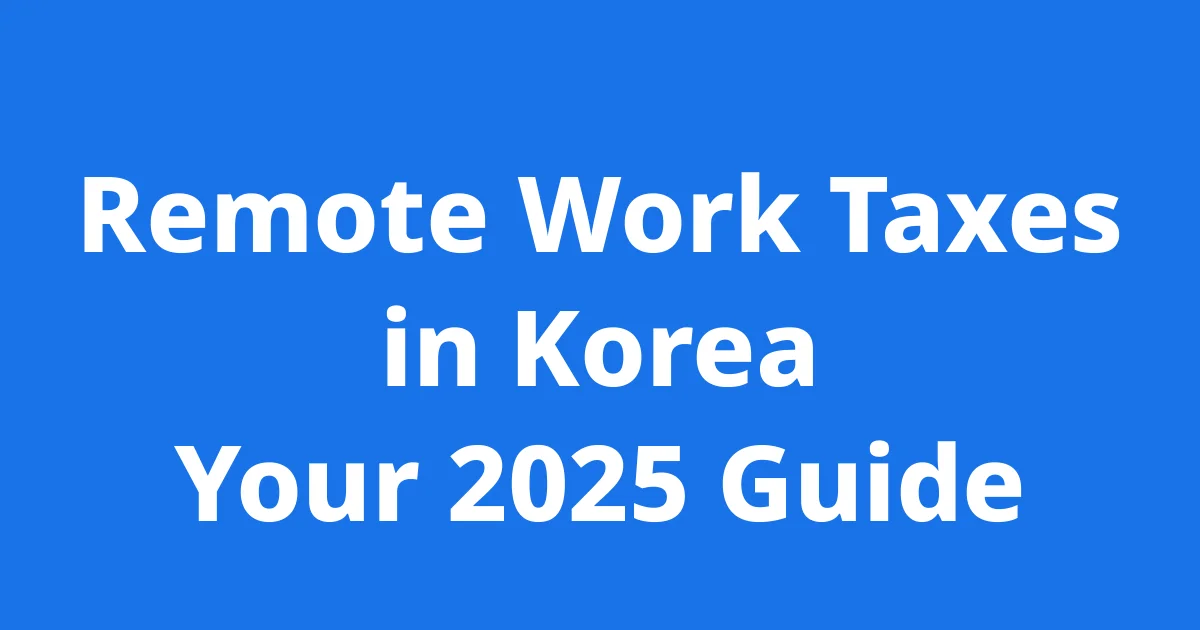
📋 Table of Contents
Hello there, future remote work expert! 😊 Have you ever thought about working from anywhere in the world, maybe even South Korea? It sounds super exciting, right? But just like packing your bags, you also need to pack some knowledge about taxes!
Today, more and more people are doing remote work in Korea, and guess what? Taxes are a big deal for everyone involved, whether you’re from Korea or another country. With new rules like the 2025 tax law changes and the cool digital nomad visa, it’s super important to understand all the ins and outs. Let’s explore the world of remote work taxes Korea together, step by step!
Welcome to Remote Work in Korea!

Young professionals working remotely in Seoul.
The world of work is changing so fast! Many people now enjoy the freedom of remote work, often called “remote work” or “work from anywhere.” Korea is no exception, and it’s becoming a popular spot for remote workers from all over the globe. Because of this, both people working remotely and the companies hiring them need to be extra careful about following tax and employment rules.
Big changes are coming, especially with the 2025 tax law amendments and the new digital nomad visa. These changes are making it even more important to know how remote work taxes Korea work. It’s like learning the rules of a new game before you play!
Always keep up-to-date with the latest tax news. Rules can change, and you don’t want to miss anything important about your Korea remote work tax situation!
Are You a Tax Resident in Korea?
 Do you pay taxes where you live or where your company is? This can get tricky! Luckily, Korea has special agreements called Double Taxation Agreements (DTA) with over 90 countries. These agreements help make sure you don’t have to pay taxes on the same income twice!
Do you pay taxes where you live or where your company is? This can get tricky! Luckily, Korea has special agreements called Double Taxation Agreements (DTA) with over 90 countries. These agreements help make sure you don’t have to pay taxes on the same income twice! When a DTA is in play, there are specific rules to figure out which country gets to tax you. It looks at things like how long you stay, where your family lives, and what kind of income you have. It also includes rules for getting credit for taxes you’ve already paid in another country. It’s like a fair play rulebook for international taxes!
How DTA Helps You 📝
- Avoid Double Payment: Stops you from paying taxes on the same money in two different countries.
- Clear Rules: Helps decide which country has the right to tax different types of income.
- Tax Credit: You might get a credit for taxes paid overseas, so you don’t lose out.
Remember, to use these DTA benefits, you’ll need to prepare all your paperwork carefully. Starting in 2026, the rules for submitting your application forms will become even stricter. It’s always best to be prepared! For more detailed information on tax summaries in Korea, you can check out this guide: Korea, Republic of – Individual – Income determination.
Stay Safe! Avoiding Tax Problems
Taxes aren’t the only thing remote workers need to think about in Korea! There are also social insurance and labor laws to consider. Things like National Pension, Health Insurance, and Employment Insurance might apply to remote workers too.
Your employer might need to handle your withholding tax and insurance payments, just like for regular employees. Make sure you have a clear employment contract that says where you work, and that it follows rules for minimum wage and severance pay. If you’re a foreign worker, also double-check your visa and work permit rules. Many short-term visas, like tourist visas, don’t allow remote work!
If your remote work actually helps your company do business in Korea, your company might have to pay corporate taxes in Korea! This is called a Permanent Establishment (PE) risk. These rules can be super complicated, and breaking them can lead to big fines or extra taxes.
Because things can get so complex, it’s always a super smart idea to talk to experts, both in Korea and in your home country. They can help you with tax, labor, and immigration rules. Make sure to keep all your important documents safe and sound, like your visa, residency proof, employment contract, and insurance papers. And don’t forget to meet all those important deadlines!
📚 Recommended Articles
Key Takeaways from Remote Work Taxes Korea 📝
Wow, we’ve covered a lot about remote work taxes Korea! Here’s a quick recap of the most important things to remember:
- Residency Matters: If you stay in Korea for 183 days or more, you’re usually a tax resident!
- 2025 Changes: Look out for increased corporate tax and new exit tax rules.
- Tax Options: Foreigners can choose a simple 19% flat rate, but check if progressive rates are better for you.
- Digital Nomad Visa: It’s new and has special tax benefits for the first 5 years.
- DTA is Your Friend: Double Taxation Agreements prevent you from being taxed twice.
- Beyond Taxes: Don’t forget social insurance and labor laws!
Remote Work Tax Essentials in Korea
Frequently Asked Questions ❓
Phew! We’ve journeyed through the world of remote work taxes Korea. I hope this guide has helped you understand all the important bits and pieces. Staying informed is the best way to make your remote work adventure in Korea super smooth and worry-free. If you have more questions or need clarification, please feel free to ask in the comments below! 😊
